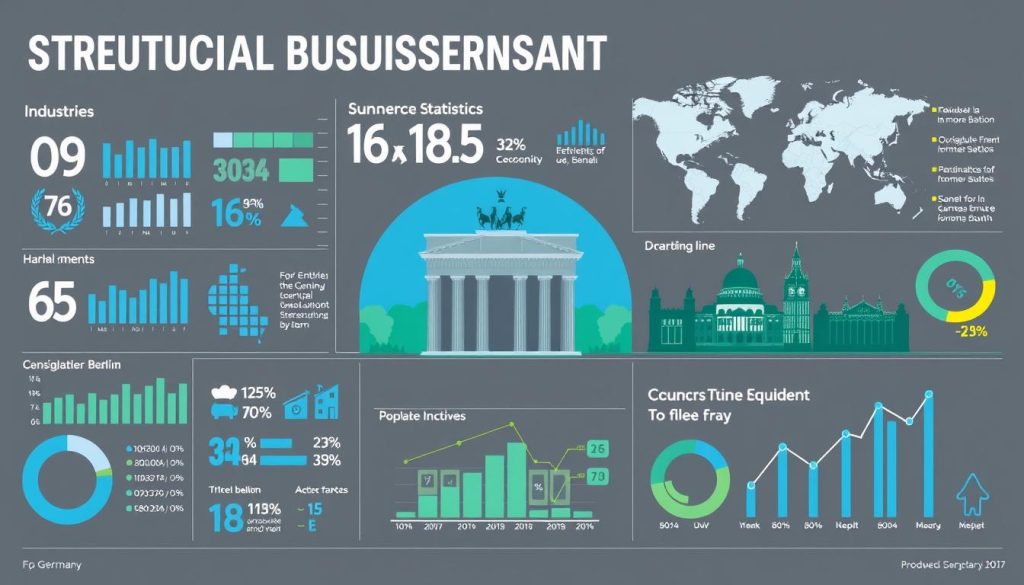In this article, we look at Structural Business Statistics (SBS) in Germany. It’s a key tool for understanding the country’s economy and different sectors. By studying Germany business statistics, we gain important insights. These help policymakers, business leaders, and scholars understand the economic scene.
Understanding SBS is crucial for keeping an eye on the economy’s health. It guides policy decisions that impact businesses. By examining SBS, we can see how businesses perform in the EU and its countries. This knowledge is essential for making decisions that help the economy grow.
As we explore SBS, we aim to show its importance. We also look at trends and dynamics in the German economy. This will help us understand the country’s economic landscape better.
Understanding Structural Business Statistics (SBS)
To understand Structural Business Statistics (SBS), we need to know what it is and its role in the economy. SBS is key for studying different economic activities in the European Union, especially in Germany. It looks at important areas like value added, investment, and labour, helping us see how sectors change and grow.
Definition and Importance of SBS
The definition of SBS shows it’s a vital source for economic analysis. It helps us see how it impacts businesses and economic theories. SBS is more than numbers; it gives us insights into how wealth is made, where investments go, and how sectors perform.
Every piece of data in SBS helps us understand the business economy better. It’s the basis for making smart decisions.
How SBS Supports Economic Policies
Looking into SBS and economic policies shows its crucial role in shaping policies. The data from SBS is essential for making economic decisions. It helps policymakers create plans to boost the economy and create jobs.
Insights from SBS guide governments to improve how resources are used, manage economic ups and downs, and encourage new businesses. This makes SBS a key player in making effective economic policies.
Key Features of Structural Business Statistics in Germany
Exploring structural business statistics in Germany sheds light on our economy. It shows the wide range of sectors covered by SBS. The SBS sectors in Germany include many economic activities, giving a full picture of the country’s industrial and service sectors.
Sector Coverage of SBS in Germany
The SBS covers all parts of the business world, using the NACE Rev. 2 classification. Important sectors include:
- Construction
- Distributive trades
- Professional, scientific, and technical activities
- Human health and social work activities
This wide range of sectors lets us dive deep into Germany’s business world. For example, the manufacturing sector is huge, adding about €2,420 billion in 2022. This shows how big these sectors are for our economy.
Focus on Small and Medium-sized Enterprises (SMEs)
SBS also focuses on Small and Medium-sized Enterprises, or SMEs in Germany. These businesses are key to our economy. About 99.8% of EU businesses are small, adding up to 50.2% of the economy’s value. They also employ nearly two-thirds of the workforce.
SMEs are crucial for innovation, jobs, and growth. Knowing about SMEs in Germany helps make policies better. It lets us help these businesses grow and contribute more to the economy.

Structural Business Statistics in Germany: Recent Trends
Looking at Structural Business Statistics (SBS), we see how different sectors in Germany have contributed to the economy. This analysis shows how each sector did well in 2022. It’s key for planning policies and predicting the economy’s future.
Economic Contributions of Different Sectors
Services were the biggest in 2022, with distributive trades leading at 18.1% of all enterprises. Professional, scientific, and technical activities followed, making up 15.6% of enterprises. The manufacturing sector added around €2,420 billion, showing the wide range of contributions.
The manufacturing sector alone employed over 30 million people. This shows the potential for growth and investment. Looking at SBS trends for 2022, we see the need for strategies to help struggling sectors.
Employment and Value Added Insights for 2022
In 2022, Germany’s business economy employed over 160 million people. Together, they created over €10,047 billion in value. Small and medium-sized enterprises (SMEs) were crucial, making up 99.8% of all businesses and 50.2% of the value added.
Almost two-thirds of the workforce came from SMEs. This shows their importance in keeping jobs and boosting the economy. These trends help us understand the economy and guide future investments and policies.

Analysis by Enterprise Size Class
In Germany, most businesses are small, with about 99.8% being micro, small, or medium-sized enterprises (SMEs). These SMEs are key to the economy. By studying SBS enterprise size classes, we learn how they fit into the bigger economic picture.
Distribution of Enterprises in Germany
Germany’s business scene is varied, with most being small. Medium and large businesses are important in specific areas. The spread across SBS enterprise size classes shows the number and roles of businesses. It shows how SMEs drive the economy and create jobs.
Value Added Contributions by Enterprise Size
The size of a business affects its economic impact in Germany. Even though small businesses are most common, they don’t add as much value as bigger ones. Yet, SMEs make up over 50% of the total value added in the economy. This shows how crucial SMEs are for the economy, but also points out the differences in their contributions.
The Role of SBS in Economic Analysis
Structural Business Statistics (SBS) is key in economic analysis. It helps researchers and policymakers understand our economy’s complex workings. SBS collects detailed data on business activities across different sectors.
This data is vital for studying productivity and business financial health. It supports SBS economic research. This way, we can see how economic policies affect us and predict future growth.
Looking at specific sectors, like human health and social work, gives us important insights. For example, in 2021, this sector was a big part of the EU’s economy. Germany was at the forefront in value added and employment.
This information is crucial for understanding which sectors boost the economy. It shows where we might need to make policy changes.
Using SBS to understand the economy helps us make better choices. It lets us dive into trends and challenges faced by businesses. Mid-caps, in particular, play a big role in the European economy.
By using SBS data in economic studies, we prepare for strong policy-making. This is essential for sustainable economic growth.

